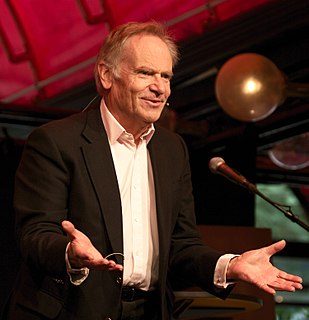A Quote by Tom Perrotta
I'm not sure that it's possible to write a novel about people who don't transgress or stumble, people who don't surprise themselves with the things they do, people who can explain all their actions with perfect logical consistency. At least it's not possible for me to write that sort of novel.
Related Quotes
The age of the book is not over. No way... But maybe the age of some books is over. People say to me sometimes 'Steve, are you ever going to write a straight novel, a serious novel' and by that they mean a novel about college professors who are having impotence problems or something like that. And I have to say those things just don't interest me. Why? I don't know. But it took me about twenty years to get over that question, and not be kind of ashamed about what I do, of the books I write.
They take the circuits out of people’s brains that make it possible for them to think for themselves. Their world is like the one that George Orwell depicted in his novel. I’m sure you realize that there are plenty of people who are looking for exactly that kind of brain death. It makes life a lot easier. You don’t have to think about difficult things, just shut up and do what your superiors tell you to do.
I try not to write more than two or three, I try to just write one if possible, I write till the end at least a draft of a play or a novel; but sometimes, I'll take a break for a couple weeks for a project that is paying me money like a television project which I try to stay away from just to stay financially ahead of the game.
You can't have a novel without real, believable people, and once you get into either too theoretical a novel or too philosophical a novel, you get into the dangers that the French novel has discovered in the past 50 or 60 years. And you get into a sort of aridity. No, you have to have real, identifiable people to whom the reader reacts in a way as if they were real people.
I would like to write a novel, or at least try to write one, although my motives are not entirely pure. For one thing, I get asked about writing novels so much that I feel guilty about never having written one. And although I have no strong desire to write a novel, I would hate not to try. That would just be silly. On the other hand, I hate the idea of slogging through something that turns out to be not good.
Objectifying your own novel while writing it never really helps. Instead, I guess while you're writing you need to think: This is the novel I want to write. And when you're done you need to think: This is what the novel I wanted to write feels like and reads like and looks like. Other people might call it sweeping or small, but it's the book you chose.
I don't impose political responsibilities on my fiction. The last thing I would ever want to do, for example, is write a novel that would appear to want to tell people what to think about the immigration debate, and I would never write a novel whose sole ambition was to give a "positive" view of immigrants. I'm for open borders, by the way - down with the nation state!







































